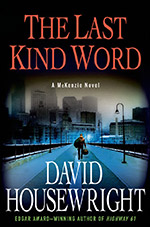There are seriously few writers who can beat David Housewright for sheer storytelling power. His books hit the ground running and don’t let up until the last page. This is the latest Rushmore “Mac” MacKenzie novel, and Housewright has taken a slightly new tack. Mac is undercover as desperate criminal Dyson in order to help catch a band of robbers and more importantly, the gunrunners who are supplying them with weapons at the Canadian border.
 The opening chapter is pure, classic Housewright. The only other author who can match his opening chapter skills is Barbara D’Amato, who has several first chapters that remain my favorites of all time, her ultimate being the baby crawling across Chicago’s Dan Ryan expressway in 2010’s Other Eyes.
The opening chapter is pure, classic Housewright. The only other author who can match his opening chapter skills is Barbara D’Amato, who has several first chapters that remain my favorites of all time, her ultimate being the baby crawling across Chicago’s Dan Ryan expressway in 2010’s Other Eyes.
Housewright’s book opens with two prisoners being transported through the wilds of Minnesota’s back woods and their ultimate escape. Of course the mastermind is MacKenzie, but his identity is under wraps as you race through the first chapter waiting to see what unfolds. That’s the great things about Housewright – every story he tells feels fresh, even if he’s using old and well used tropes, as he often is.
“Dyson” goes undercover with the other escapee, Dave’s, family. Known to the media as “The Iron Range Bandits,” they are in reality a sad group of desperate folks blindsided by a bad economy in a traditionally hard scrabble area. MacKenzie has a very well developed Robin Hood/White Knight complex – in this novel, the Robin Hood part gets in the way of the job he’s trying to do.
As Dyson, he’s a bit of a hard ass. As MacKenzie, not so much. As he and the bandits plan an elaborate robbery, he starts to feel bad for almost every member of the family, all of whom Housewright has delineated in a crisp and memorable manner. He finds himself in the uncomfortable role of the “boss”, and in truth, he’s much more sophisticated that just about all of the bandits, though like any newcomer to any group, he makes his share of wrong assumptions.
The title comes from the last kind word spoken to Christ by his fellow sufferer, who was a robber. While the moral isn’t exactly there’s good in everyone (there are definite bad guys here) it might be that there’s good in very unexpected places. Dyson/Mac is challenging our own assumptions.
While I’ve made the comparison before, it bears repeating: if you are missing the snappiness of Robert B. Parker’s Spenser, look no further. David Housewright, in all his Minnesota glory (and wouldn’t Spenser have enjoyed a “Leinie” right along with Mac?) is Parker’s direct descendant. This is another terrific story – I can’t wait for the next one.